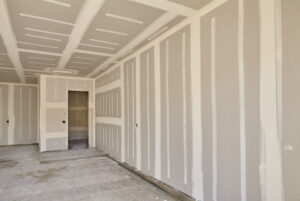Home improvements are generally not tax deductible, but there are exceptions. You can write off improvements made for medical reasons, home office use, and on rental properties. Energy-efficient upgrades may qualify for the Residential Energy Efficient Property Credit. Always consult with a tax professional to understand specific deductions and ensure compliance with IRS guidelines.
Have you ever asked yourself if you can write off home improvements? We’ve owned 9 homes including rental properties, and have completed countless improvement projects over our 35 years of marriage and home ownership. Having worked with a fantastic CPA over the past 10+ years, we have become familiar what is and what is not generally accepted as a tax write-off.
In this post, we’ll look into the details of home improvements and tax deductions. So, If you’re a homeowner planning a remodel, or if you have recently completed some home improvements, read on. We’ll look at the IRS’s stance on home improvement expenses, and some light on the nuances of tax laws and regulations. So stick with me as we take a hard look into this intriguing topic.
Disclaimer: I am not an accountant or tax attorney, so this article is based on my experience and current research into this topic – not tax deduction instructions. You should view this article as a guideline for planning purposes that may give you some ideas on what is and what is not deductible. Before taking any deductions on your taxes, consult with a qualified account or CPA if you plan on taking any deductions based on home improvements.
Can Home Improvements Be Tax Deductible?
The question of whether home improvements are tax deductible is a common one among homeowners. Generally, home improvements are not tax deductible. However, we’ve found that there are certain exceptions to this rule.
If your home improvement is classified as a medical necessity, such as installing ramps for a wheelchair, you may be eligible for a tax deduction. This is under the premise that the improvement increases the value of your home and is not covered by insurance.
Another exception is in the case of home offices. If you use a part of your home exclusively for business as we do, you may be able to write off a portion of the cost. This includes improvements made to the area used for business.

Also, if you make improvements to your rental property, you can deduct these expenses. This is because the IRS considers rental property expenses as a business expense. From personal experience, owning a rental property can be a fantastic tax shelter. Even in these times of higher interest rates, this could be a great move for you if you are in any position to do so.
In terms of energy-efficient improvements, you may qualify for a Residential Energy Efficient Property Credit. This credit can help offset the costs of installing alternative energy equipment in your home.
What Qualifies as a Home Improvement?
When discussing home improvements, many people tend to think about major renovations. However, the term encompasses a lot more than just large-scale projects. Home improvements can be anything that adds value to your property, enhances its functionality, or makes it more appealing. Common examples include installing new flooring, updating kitchen appliances, adding a new room, or even landscaping your yard.
The IRS has specific criteria for what can be considered a home improvement. According to the IRS, these improvements must have a useful life of more than one year and must add value to the home. This includes renovations like a new roof, a remodeled kitchen, or an added deck.

I’m going to be a little redundant here intentionally. Not all home improvements are tax-deductible. Generally, you cannot deduct the cost of home improvements on your tax return unless it is for medical reasons or if the home is used for business purposes. For instance, if you have a home office and make improvements to that space, you may be able to deduct a portion of the costs.
Here are a few examples of home improvements that can be tax-deductible:
- Home office improvements: If you use part of your home exclusively for your business, you can write off the costs of improvements to that area.
- Energy-efficient upgrades: Certain energy-saving home improvements can qualify for tax credits.
- Medical improvements: If you make improvements to your home for medical purposes, such as installing ramps or modifying bathrooms, these costs can be deductible.

How to Claim Home Improvements on Taxes?
The process of claiming home improvements on your taxes involves understanding the difference between tax deductions and tax credits. While most home improvements cannot be directly written off, they can add to the value of your home, which can result in tax savings when you sell your property.
The Internal Revenue Service (IRS) allows homeowners to deduct the interest on home improvement loans if the loan is used to “buy, build or substantially improve” the home that secures the loan. This is known as the home mortgage interest deduction.
Here are the steps to claim home improvements on your taxes:
1. Keep all receipts and records of home improvements.
2. Determine if the improvements are eligible for tax deductions.
3. Calculate the total cost of the improvements.
4. Claim the home mortgage interest deduction if applicable.
Remember, capital improvements that increase your home’s value or extend its life can be included in the cost basis of your property, which can lower your taxable gain when you sell your home. However, repairs or maintenance cannot be claimed as tax deductions.
Always consult with a tax professional to ensure you’re maximizing your potential savings and staying within the IRS guidelines. With careful planning and record-keeping, you can benefit from your home improvements when tax season arrives.
Are Energy-Efficient Improvements Deductible?
The IRS allows homeowners to claim certain energy-efficient home improvements as tax deductions. This includes Energy Star certified products such as solar panels, wind turbines, and geothermal heat pumps. The Residential Energy Efficient Property Credit allows homeowners to deduct up to 30% of the cost of these improvements.
However, not all home improvements qualify for this deduction. For instance, traditional home renovations like kitchen upgrades or bathroom remodels are not tax-deductible. The key is the improvement must be energy-efficient and certified by the Energy Star program.
Remember, to claim these deductions, you must itemize your deductions on your tax return. Here are the steps to follow:
1. Purchase and install a qualifying energy-efficient product.
2. Keep all receipts related to the purchase and installation.
3. Fill out IRS Form 5695 and include it with your tax return.
It’s also important to note that state and local governments may offer additional incentives for energy-efficient home improvements. These can take the form of tax credits, rebates, or discounts on energy bills. Homeowners should check with their local utility company or state energy office for information on these programs.
While energy-efficient home improvements can result in significant tax savings, it’s crucial to do your research and understand the specific requirements and limitations of these deductions. With careful planning, you can make your home more energy-efficient and save money on your taxes at the same time.
Are Repair Costs Tax Deductible?
When it comes to home improvements, many homeowners wonder if they can get a tax break. Repair costs are not typically deductible on your personal tax return. These are considered maintenance costs, not improvements that increase the value of your home.
However, if you use a portion of your home for business purposes, you may be able to deduct a portion of your repair costs. This is known as the home office deduction. It’s important to note that the area must be used exclusively for business to qualify for this deduction.
If you are a landlord, repair costs for your rental property are tax-deductible. These can include anything from fixing a leaky faucet to replacing a broken window. The IRS considers these expenses as necessary for managing your rental property.
Capital improvements, on the other hand, can be tax-deductible. These are improvements that increase the value of your home, prolong its useful life, or adapt it to new uses. Examples include installing a new roof, adding a room, or upgrading your kitchen or bathroom. These costs can be added to the basis of your home, reducing the amount of gain when you sell your property.
Remember, it’s always best to consult with a tax professional to understand what home improvement costs you can and cannot deduct on your taxes.
Can I Write Off A Home Office?
We’ve mentioned this a few time already. Indeed, the Internal Revenue Service (IRS) allows you to write off a portion of your home as a business expense if you use it exclusively and regularly for your work. This is known as the home office deduction. However, there are specific criteria that must be met to qualify for this deduction.
Firstly, the space must be used exclusively for conducting business. This means it cannot be a multipurpose area, such as a dining room that you also use as a workspace. Secondly, the space must be your principal place of business. If you have another office elsewhere, you may not claim this deduction.
• The home office deduction is calculated based on the percentage of your home that is used for business. For instance, if your home office occupies 10% of your home, you can deduct 10% of your mortgage interest, property taxes, and utility bills.
Moreover, there are two methods to calculate this deduction: the simplified method and the regular method. The simplified method allows you to deduct $5 per square foot of your home office, up to a maximum of 300 square feet. The regular method requires more detailed record-keeping, as it involves determining the actual expenses of your home office.
Remember, it’s vital to keep detailed records of your expenses in case of an IRS audit. Also, be aware that taking a large home office deduction can trigger an audit, so it’s advised to consult with a tax professional before claiming this deduction.
Finally, it’s important to note that only self-employed individuals can claim the home office deduction. If you’re an employee who works from home, unfortunately, you can’t claim this deduction.
Does Landscaping Count as a Home Improvement?
When considering home improvements, many homeowners overlook the potential of their outdoor spaces. Landscaping, in fact, is a significant aspect of home improvement. It not only enhances the aesthetic appeal of your property but can also increase its market value.
Landscaping involves a variety of tasks, such as planting trees and flowers, installing irrigation systems, building patios and decks, and more. These tasks not only beautify your outdoor space but also contribute to the overall value and functionality of your home.
Landscaping can be a significant investment, and homeowners often wonder if they can write off these expenses. In general, the Internal Revenue Service (IRS) does not allow homeowners to deduct landscaping costs as a home improvement expense. However, there are exceptions. For instance, if you use part of your home for business, you may be able to deduct a portion of your landscaping costs.
Another scenario is if the landscaping is part of a medical treatment. For example, if a doctor prescribes landscaping changes for health reasons, these costs may be deductible as medical expenses.
Here are a few points to remember:
- Landscaping is considered a home improvement
- Generally, landscaping costs are not tax-deductible
- Exceptions exist for business use and medical reasons
While landscaping can significantly enhance your home’s appeal and value, it’s essential to understand the financial implications. Always consult with a tax professional to understand how your home improvement projects can impact your taxes.
How Does Home Improvement Affect Home Value?
Home improvements can significantly increase the value of your property. Whether it’s a new kitchen, bathroom, or an added extension, these enhancements can provide a substantial return on investment when it comes time to sell. However, it’s essential to remember that not all home improvements are created equal. Some projects, like adding a swimming pool or elaborate landscaping, may not yield as high a return as others.
One of the most valuable improvements you can make is updating your kitchen. This is often the heart of the home, and potential buyers place a high value on modern, functional spaces. Similarly, bathroom remodels can increase home value. Outdated bathrooms can be a significant deterrent for potential buyers, and modern, luxurious bathrooms can make your home more desirable.
Energy-efficient upgrades are another area where homeowners can see a significant return. With the increasing emphasis on sustainability and energy conservation, homes with energy-efficient features such as solar panels, high-efficiency appliances, or upgraded insulation can command higher prices.
In terms of tax benefits, it’s important to note that while home improvements can increase the value of your home, most are not typically tax-deductible. However, certain improvements related to medical needs or energy efficiency may qualify for tax credits.
– Kitchen remodel
– Bathroom upgrade
– Energy-efficient enhancements
Remember, the key is to choose improvements that will appeal to the broadest range of potential buyers. While personal preferences and needs play a role in deciding what improvements to make, consider the potential return on investment and the appeal to future buyers when planning your home improvement projects.
Wrapping Up: Can You Write Off Home Improvements?
The subject of tax deductions for home improvements is a complex one. We’ve covered the key aspects to consider, such as understanding what qualifies as a home improvement, knowing how to claim these on your taxes, and the potential benefits of energy-efficient improvements.
The importance of distinguishing between repair costs and improvements was highlighted, as was the potential for deductions through a home office. We also touched on more unique areas, such as whether landscaping counts as a home improvement and how these upgrades can affect your home’s value.
These points underscore the importance of our central topic – “can you write off home improvements”. The knowledge gained can be a valuable tool in your financial planning, potentially saving you money while enhancing your living space.
This is one of many facts and tips that I think are important for any homeowner to know. For a comprehensive list of Common Sense Tips That All Homeowners Should Know, check out our detailed article here.
As I may have mentioned a time or two throughout the article, always consult with a tax professional to ensure you’re maximizing your deductions while staying within the law. As for future developments, keep an eye on tax code changes or new incentives that may further expand the scope of deductible home improvements. This ever-evolving landscape could have a significant impact on your tax planning and home improvement decisions moving forward.




